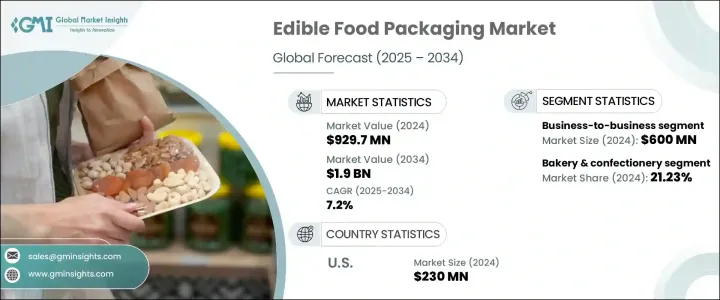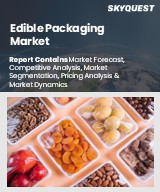
|
시장보고서
상품코드
1721444
식용 식품 포장 시장 기회, 성장 촉진요인, 산업 동향 분석 및 예측(2025-2034년)Edible Food Packaging Market Opportunity, Growth Drivers, Industry Trend Analysis, and Forecast 2025 - 2034 |
||||||
세계의 식용 식품 포장 시장은 2024년에는 9억 2,970만 달러로 평가되었고, CAGR 7.2%를 나타내 2034년에는 19억 달러에 이를 것으로 예상되고 있습니다. 건강과 웰빙 동향에 따른 솔루션에 대한 수요를 밀어 올리고 있습니다. 식용 포장은 소비 또는 퇴비화되도록 설계되어 매립지와 해양에 대한 부담을 줄일 수 있습니다.

시장 성장에는 몇 가지 중요한 요소가 있습니다. 가장 강력한 원동력 중 하나는 환경 및 사회적 책임을 지원하는 제품을 선호하는 환경 의식이 높은 소비자, 특히 젊은 층의 상승입니다. 일회용 플라스틱을 단속하는 정부의 정책도 세계의 지속가능성의 목표와 함께 채용을 가속시키고 있습니다. 단백질 기반의 화합물 등 천연 소재의 혁신적인 이용을 추진함으로써 눈에 띄고 있습니다. 브랜드는 기능적인 요건을 충족할 뿐만 아니라 미적 감각이나 윤리적 가치관에도 호소하는 포장을 디자인함으로써 대응하고 있습니다.
| 시장 범위 | |
|---|---|
| 시작 연도 | 2024년 |
| 예측 연도 | 2025-2034년 |
| 시작 금액 | 9억 2,970만 달러 |
| 예측 금액 | 19억 달러 |
| CAGR | 7.2% |
식용 식품 포장은 성능과 지속가능성을 모두 실현하는 식물 유래, 퇴비화 가능, 생분해성 소재의 통합에 의해 진화하고 있습니다. 소비자는 편의성과 식품의 안전성을 희생하지 않고 플라스틱을 배제한 포장을 선택하게 되어 있습니다.
베이커리 및 제과 부문은 2024년에 21.23% 시장 점유율을 차지했습니다. 페이스트리나 케이크 등의 상품에 식용 랩을 채용하고 있습니다. 이런 변화는 보다 환경 친화적인 경영을 장려하는 지역의 프로그램이나 외식 정책에 의해 지지되고 있습니다.
미국의 식용 식품 포장 시장은 2024년에 2억 3,000만 달러에 달했습니다. 음식물 쓰레기 저감뿐만 아니라 영양가도 제공할 수 있습니다. 기후를 의식한 선택이 구매 행동에 영향을 미치고 있으며, 기존 브랜드와 신흥 기업 모두 환경 친화적인 가치관과 책임있는 조달 관행에 따른 포장의 혁신을 꾀하고 있습니다.
이 시장의 유력 기업은 Tipa Corp Ltd., Notpla Limited, TSUKIOKA FILM PHARMA CO.Ltd., SIG Group, Evoware(PT. Evogaia Karya Indonesia), WikiCell Designs Inc. 등이 있습니다. WikiCell Designs Inc.는 보존 기간이 길고 내습성이 강화된 바이오 필름을 개발하기 위해 연구 개발에 투자하고 있습니다. 신뢰를 구축하기 위해 인증과 정부의 지원을 활용하는 기업도 많습니다.
목차
제1장 조사 방법과 범위
제2장 주요 요약
제3장 업계 인사이트
- 생태계 분석
- 밸류체인에 영향을 주는 요인
- 이익률 분석
- 파괴적 혁신
- 향후 전망
- 제조업체
- 유통업체
- 공급업체의 상황
- 이익률 분석
- 주요 뉴스와 대처
- 규제 상황
- 영향요인
- 성장 촉진요인
- 엄격한 환경 정책
- 정부 및 규제 당국의 인센티브
- 소비자의 환경 의식의 고조
- 순환형 경제와 제로웨이스트 이념과의 무결성
- 소비자 체험의 향상과 브랜드의 차별화
- 업계의 잠재적 위험 및 과제
- 극한 조건 하에서의 내구성
- 확장성을 위한 높은 R&D 비용
- 성장 가능성 분석
- Porter's Five Forces 분석
- PESTEL 분석
제4장 경쟁 구도
- 서론
- 기업 시장 점유율 분석
- 경쟁 포지셔닝 매트릭스
- 전략적 전망 매트릭스
제5장 시장 추계·예측 : 유형별(2021-2034년)
- 주요 동향
- 다당류 기반 포장
- 단백질 기반 포장
- 지질 기반 포장
- 복합 포장
제6장 시장 추계·예측 : 제품별(2021-2034년)
- 주요 동향
- 필름 및 랩
- 코팅
- 캡슐 및 봉지
- 가방 및 파우치
제7장 시장 추계·예측 : 유통 채널별(2021-2034년)
- 주요 동향
- 기업 간 거래(B2B)
- 기업 간 소비자(B2C)
제8장 시장 추계·예측 : 용도별(2021-2034년)
- 주요 동향
- 베이커리 및 제과류
- 유제품
- 고기, 닭고기, 해산물
- 과일 및 채소
- 바로 먹을 수 있는 식사
- 음료
- 기타
제9장 시장 추계·예측 : 지역별(2021-2034년)
- 주요 동향
- 북미
- 미국
- 캐나다
- 유럽
- 영국
- 독일
- 프랑스
- 이탈리아
- 스페인
- 아시아태평양
- 중국
- 인도
- 일본
- 한국
- 호주 및 뉴질랜드
- 라틴아메리카
- 브라질
- 멕시코
- 중동 및 아프리카
- 아랍에미리트(UAE)
- 사우디아라비아
- 남아프리카
제10장 기업 프로파일
- Devro PLC
- Ecolotec
- Evoware(PT. Evogaia Karya Indonesia)
- FlexSea
- Glanbia PLC
- Lactips
- MonoSol LLC
- Mori(fka Cambridge Crops)
- Notpla Limited
- SIG Group
- Tipa Corp Ltd.
- TSUKIOKA FILM PHARMA CO. LTD.
- WikiCell Designs Inc.
The Global Edible Food Packaging Market was valued at USD 929.7 million in 2024 and is estimated to grow at a CAGR of 7.2% to reach USD 1.9 billion by 2034. This market is gaining rapid momentum as consumers and industries alike shift toward more sustainable and environmentally responsible packaging alternatives. Growing concerns about plastic pollution and its harmful impact on ecosystems are pushing demand for solutions that not only minimize waste but also align with health and wellness trends. Edible packaging offers a unique advantage in the sustainability movement-it's designed to be consumed or composted, reducing the burden on landfills and oceans. In a world increasingly driven by eco-awareness, this packaging form is emerging as a frontrunner in the sustainable packaging revolution.

Market growth is being fueled by several key factors. One of the strongest drivers is the rise of eco-conscious consumers, particularly among younger demographics who prioritize products that support environmental and social responsibility. Government policies cracking down on single-use plastics, along with global sustainability goals, are also accelerating adoption. As circular economy principles take hold, edible packaging stands out by promoting zero-waste practices and innovative use of natural materials such as seaweed, starch, and protein-based compounds. Brands are responding by designing packaging that not only meets functional requirements but also appeals to aesthetics and ethical values. Companies that lead with sustainable solutions are gaining market share as shoppers increasingly expect packaging that protects both food and the planet.
| Market Scope | |
|---|---|
| Start Year | 2024 |
| Forecast Year | 2025-2034 |
| Start Value | $929.7 Million |
| Forecast Value | $1.9 Billion |
| CAGR | 7.2% |
Edible food packaging is evolving through the integration of plant-based, compostable, and biodegradable materials that deliver on both performance and sustainability. In 2024, the business-to-consumer segment reached USD 330 million, driven by a strong shift toward natural and organic packaging in everyday food products. From snacks and dairy to beverages and confectionery, consumers are opting for packaging that eliminates plastic without sacrificing convenience or food safety. Growing public awareness of environmental issues is turning eco-friendly packaging into a selling point for many food brands. Functional attributes such as moisture resistance and shelf-life preservation are becoming standard in modern edible packaging solutions.
The bakery and confectionery segment accounted for a 21.23% market share in 2024. Edible films and coatings used in baked goods enhance flavor, texture, and product longevity while reducing the environmental footprint. Local bakeries and food retailers are embracing edible wraps in items like pastries and cakes as part of their sustainability efforts. These changes are supported by local programs and food service policies encouraging greener operations. As sustainability becomes central to culinary innovation, the edible packaging space is gaining traction across artisanal and commercial baking industries.
The U.S. Edible Food Packaging Market reached USD 230 million in 2024. American consumers are leaning toward packaging made from natural, health-forward ingredients, particularly in snacks and sweets. These solutions not only cut down on waste but can also deliver nutritional value. Climate-conscious choices are influencing buying behavior, and both legacy brands and startups are racing to innovate with packaging that aligns with green values and responsible sourcing practices.
Prominent players in the market include Tipa Corp Ltd., Notpla Limited, TSUKIOKA FILM PHARMA CO. LTD., SIG Group, Evoware (PT. Evogaia Karya Indonesia), and WikiCell Designs Inc. Companies are investing in R&D to create bio-based films with longer shelf life and enhanced moisture resistance. Strategic partnerships with food producers and tech firms are helping scale production sustainably. Many are leveraging certifications and government support to build consumer trust. By embracing clean-label, health-conscious, and zero-waste trends, brands are establishing strong market positions and deepening their appeal to green-minded buyers.
Table of Contents
Chapter 1 Methodology & Scope
- 1.1 Market scope & definitions
- 1.2 Base estimates & calculations
- 1.3 Forecast calculations
- 1.4 Data sources
- 1.4.1 Primary
- 1.4.2 Secondary
- 1.4.2.1 Paid sources
- 1.4.2.2 Public sources
Chapter 2 Executive Summary
- 2.1 Industry synopsis, 2021-2034
Chapter 3 Industry Insights
- 3.1 Industry ecosystem analysis
- 3.1.1 Factor affecting the value chain
- 3.1.2 Profit margin analysis
- 3.1.3 Disruptions
- 3.1.4 Future outlook
- 3.1.5 Manufacturers
- 3.1.6 Distributors
- 3.2 Supplier landscape
- 3.3 Profit margin analysis
- 3.4 Key news & initiatives
- 3.5 Regulatory landscape
- 3.6 Impact forces
- 3.7 Growth drivers
- 3.7.1 Stringent environmental policies
- 3.7.2 Government & regulatory incentives
- 3.7.3 Growing consumer eco-consciousness
- 3.7.4 Alignment with circular economy and zero-waste ideals
- 3.7.5 Enhanced consumer experience & brand differentiation
- 3.8 Industry pitfalls & challenges
- 3.8.1 Durability under extreme conditions
- 3.8.2 High r&d costs for scalability
- 3.9 Growth potential analysis
- 3.10 Porter’s analysis
- 3.11 PESTEL analysis
Chapter 4 Competitive Landscape, 2024
- 4.1 Introduction
- 4.2 Company market share analysis
- 4.3 Competitive positioning matrix
- 4.4 Strategic outlook matrix
Chapter 5 Market Estimates & Forecast, By Type, 2021-2034 (USD Million & Kilotons)
- 5.1 Key trends
- 5.2 Polysaccharides-based packaging
- 5.3 Protein-based packaging
- 5.4 Lipid-based packaging
- 5.5 Composite packaging
Chapter 6 Market Estimates & Forecast, By Product, 2021-2034 (USD Million & Kilotons)
- 6.1 Key trends
- 6.2 Films & wraps
- 6.3 Coatings
- 6.4 Capsules & sachets
- 6.5 Bags & pouches
Chapter 7 Market Estimates & Forecast, By Distribution Channel, 2021-2034 (USD Million & Kilotons)
- 7.1 Key trends
- 7.2 Business-to-business (B2B)
- 7.3 Business-to-consumer (B2C)
Chapter 8 Market Estimates & Forecast, By Application, 2021-2034 (USD Million & Kilotons)
- 8.1 Key trends
- 8.2 Bakery & confectionery
- 8.3 Dairy products
- 8.4 Meat, poultry, and seafood
- 8.5 Fruits & vegetables
- 8.6 Ready-to-eat meals
- 8.7 Beverages
- 8.8 Others
Chapter 9 Market Estimates & Forecast, By Region, 2021-2034 (USD Million)
- 9.1 Key trends
- 9.2 North America
- 9.2.1 U.S.
- 9.2.2 Canada
- 9.3 Europe
- 9.3.1 UK
- 9.3.2 Germany
- 9.3.3 France
- 9.3.4 Italy
- 9.3.5 Spain
- 9.4 Asia Pacific
- 9.4.1 China
- 9.4.2 India
- 9.4.3 Japan
- 9.4.4 South Korea
- 9.4.5 ANZ
- 9.5 Latin America
- 9.5.1 Brazil
- 9.5.2 Mexico
- 9.6 MEA
- 9.6.1 UAE
- 9.6.2 Saudi Arabia
- 9.6.3 South Africa
Chapter 10 Company Profiles
- 10.1 Devro PLC
- 10.2 Ecolotec
- 10.3 Evoware (PT. Evogaia Karya Indonesia)
- 10.4 FlexSea
- 10.5 Glanbia PLC
- 10.6 Lactips
- 10.7 MonoSol LLC
- 10.8 Mori (fka Cambridge Crops)
- 10.9 Notpla Limited
- 10.10 SIG Group
- 10.11 Tipa Corp Ltd.
- 10.12 TSUKIOKA FILM PHARMA CO. LTD.
- 10.13 WikiCell Designs Inc.



















